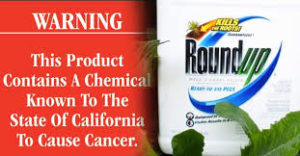16
Jul
Federal Bill Benefits Monsanto/Bayer, Overriding Labeling of Roundup/Glyphosate as a Carcinogen under California Law
 (Beyond Pesticides, July 16, 2018) Legislative Sneak Attacks Continue. Yet another bill has been introduced in Congress to remove accountability from Monsanto/Bayer for its glyphosate herbicide Roundup.™ The so-called “Accurate Labels Act” (S.3019/H.R.6022) would repeal most, if not all, existing labeling and information disclosure laws adopted by state or local governments, including California’s Safe Drinking Water and Toxic Enforcement Act (Prop 65), which has been responsible for the removal of hundreds of dangerous toxic chemicals, including lead, cadmium, and mercury, from commercial and consumer products nationwide. California listed Roundup as a probable carcinogen in 2015, requiring a label warning in the state, and California’s Fifth District Court of Appeal upheld the decision in April of this year, rejecting Monsanto’s challenge to the listing.
(Beyond Pesticides, July 16, 2018) Legislative Sneak Attacks Continue. Yet another bill has been introduced in Congress to remove accountability from Monsanto/Bayer for its glyphosate herbicide Roundup.™ The so-called “Accurate Labels Act” (S.3019/H.R.6022) would repeal most, if not all, existing labeling and information disclosure laws adopted by state or local governments, including California’s Safe Drinking Water and Toxic Enforcement Act (Prop 65), which has been responsible for the removal of hundreds of dangerous toxic chemicals, including lead, cadmium, and mercury, from commercial and consumer products nationwide. California listed Roundup as a probable carcinogen in 2015, requiring a label warning in the state, and California’s Fifth District Court of Appeal upheld the decision in April of this year, rejecting Monsanto’s challenge to the listing.
Tell your U.S. Senators and Representative to oppose S.3019/H.R.6022.
California will not only move ahead with warning labels on products that contain glyphosate, but also, prohibit discharge of the pesticide into public waterways. Proposition 65 requires notification, primarily through labeling, of all chemicals known to cause cancer, birth defects, or other reproductive harm, and prohibits their discharge into the state’s drinking waters.
As with previous sneak attacks, Monsanto’s fingerprints — if not its name – are all over this bill. Other legislation that would help remove Monsanto/Bayer accountability for glyphosate is contained in appropriations for the Agency for Toxic Substances and Disease Registry (ATSDR) and the Farm Bill. The House appropriations bill for ATSDR includes “report language” that would restrict independent evaluation of pesticide hazards by ATSDR. Monsanto pushed to stop ATSDR from researching the cancer-causing properties of its glyphosate-based herbicide, Roundup.
In April, the U.S. House Committee on Agriculture moved H.R.2 (the Farm Bill) out of committee with a provision that prohibits local governments from restricting pesticide use on private property within their jurisdictions. The full House passed the bill in June. Existing local laws in two states, Maine and Maryland, will be overturned with final passage of this law. In those 43 states that forbid local pesticide laws by state law, future reconsideration of this state prohibition — a squelching of local authority pushed by the chemical and pest management industry — will be foreclosed.
The fight to defend the authority of local governments to protect people and the environment has been ongoing for decades, reaching the U.S. Supreme Court in 1991. In response to the Supreme Court decision in Wisconsin Pub. Intervenor v. Mortier, which found in favor of localities’ authority, the pesticide lobby immediately formed the “Coalition for Sensible Pesticide Policy,” and developed boilerplate legislative language that restricts local municipalities from passing ordinances on the use of pesticides on private property. The Coalition’s lobbyists descended on states across the country, seeking and in most cases passing, preemption legislation whose text was often identical to the Coalition’s. Since the passage of those state laws, there have been numerous efforts to preempt local authority in states that do not prohibit local action on pesticides. The American Legislative Exchange Council (ALEC), an industry-backed group, appeared to be behind a failed effort over the last two years to preempt local authority in the Maine state legislature.
Tell your U.S. Senators and Representative to oppose S.3019/H.R.6022.
Letter to U.S. Senators and Representatives:
Please oppose S.3019/H.R.6022, deceptively called the “Accurate Labels Act,” would block enforcement of most state and local right-to-know laws, and even some federal programs. It is an attack on transparency and the rights of state governments. These important laws require disclosure of ingredients in everyday consumer products that are linked to potential health risks, including cancer, birth defects, developmental harm to children and other diseases. The bill is alarming and radical legislation that would repeal most, if not all, existing labeling and information disclosure laws adopted by state or local governments.
In addition, the bill would effectively prevent the future adoption of any meaningful and health-protective right-to-know laws at the state or local level for nearly all consumer products and commodities and potentially eliminate current and future federal agency-initiated information, ingredient disclosure and right-to-know requirements. the bill would likely eliminate existing state and local laws including:
* California’s landmark law, the Safe Drinking Water and Toxic Enforcement Act (Prop 65) which has been responsible for the removal of hundreds of dangerous toxic chemicals including lead, cadmium, and mercury from commercial and consumer products nationwide and requires a warning on some pesticides.
* Requirements to disclose when household furniture contains toxic flame retardant chemicals (which are not needed for fire safety), many of which are associated with learning disabilities, cancer, reproductive harm, and hormone disruption and are known to be released from furniture into indoor air and dust.
* Eleven state laws requiring disclosure of mercury, a potent brain damaging chemical, in products and the need for its proper disposal as a hazardous waste.
* Requirements for full household cleaning product ingredient disclosure.
* Requirements to report on the use of chemicals of high concern in consumer (children’s) products.
I urge you to support local and state right-to-know laws that have protected consumers across the country from dangerous chemicals in thousands of products, while incentivizing safer products in the marketplace.










